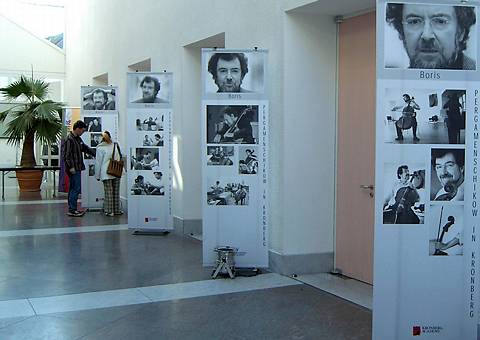|
<< -- 4 -- Tess Crebbin THE PERGAMENSCHIKOW LEGACY

Last but not least, for those readers who are also cellists, here is a selection of the little teaching gems that Bernard Greenhouse dished out to his tired but happy young students the following morning:
'Your energy goes into your emotion which leads to you tightening the left hand. The vibrato is tight. There is no continuity to the phrase. Use your energy the right way so that it doesn't restrict emotion but expands it.'
'You must hear the beginning of the opening note. Don't slur it.'
'Every note has its place within that phrase. Find it and bring it out.'
'Expand your vibrato to help with the crescendo.'
'Come in here with a little hesitation, then a big push. Use the two ends together for the diminuendo, not just the bow. If I am sitting in the audience and I hear relaxation then I like it. If I hear something wobbly I can't relax.'
'If your left hand is not behaving it is not with what you are trying to express. Let your fingers be a little tighter and they will take the tension off the end. Right now you put so much tension there that it stops the sound.'
'Think of what you are saying with this music while you play it: you have said everything you are going to tell her. Now you have no more strength left, just love. This means: don't push your vibrato, relax it.'
'When you play pianissimo it's not off the finger, it's off the bow. Just touch my finger on the cello and you will find that it is like a rock there. You can't get it off the string. That's what gives it the sound.'
'Leave the vibrato in, but less sound.'
'Think always how to make your playing more exciting, how to make each phrase more beautiful.'
'This starts all wrong. It's not a sad piece. I don't want to start crying as soon as it starts. It's full of life, it's a Viennese piece. Make a happy face. You may not agree with my feeling about it but I really don't think it's a sad piece. It's a happy feeling the composer is trying to convey and so make a happy face when you play it. You have one eye crying and the other eye laughing. Laugh with both eyes.'
'You have to take a stance for this piece. You raised your shoulder and played with a different sound not appropriate to the piece. I want to hear something other than flatando. If you raise your shoulder you take the weight off the bow and that changes the sound. Be careful of that and relax your shoulder. Much is expressive in this piece but on a smaller scale than you are giving me right now. Play with sensitivity but try to produce a different kind of sound.'
'Open up and expand -- use more bow. Open yourself up to the feeling of happiness that this piece contains.'
'Change, don't keep in the same mood throughout. Each phrase has its own thing to say so say it.'
'Your fingering kills you. Don't let your fingers be your master. Get off it so you have more variety of sound. You play it very well but not musical. I want something that takes you out of your chair. There needs to be more strength in the bow.'
'Careful of the top note. Don't make it scream. Stop on the G.'
'You have this habit of swallowing the beginning of the note. The beginning has to be heard.'
'Save your bow, if you do, then you have room to expand.'
More Greenhouse wisdom, incidentally, can be found in a bi-lingual English/German book from the Kronberg Academy Publishing House, Laurinel Owen's Bowed Arts -- Reflections of Bernard Greenhouse on his life and music.

The Boris Pergamenschikow Photographic Exhibition at Kronberg. Photo © 2004 Phil Crebbin
|
As for Pergamenschikow, unfortunately no such book exists by or about him. But his students are determined to keep his legacy alive for many years to come and the Scholarship in his name, which will next be awarded in two years time, is bound to help many more fine young cellists unleash within themselves the same passion and polished skill that Pergamenschikow brought to his interpretation of the music.
| 
